Chinese AI juggernaut DeepSeek exposes Beijing’s preference for an exploitable Albanese government
DeepSeek, which launched in January as the Chinese response to ChatGPT, says it is in China’s best interests for Anthony Albanese to win the upcoming federal election and not Peter Dutton.
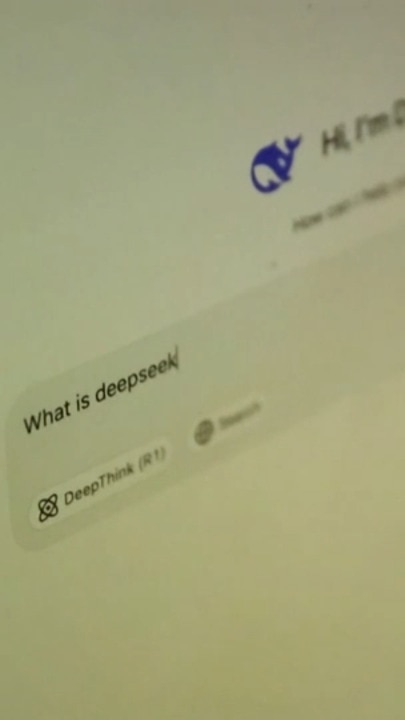
Chinese artificial intelligence app DeepSeek says it is in China’s best interests for Anthony Albanese to win the upcoming federal election because of the ‘‘fragility’’ of the Labor government and the potential for Beijing to “exploit policy inertia” under his leadership.
DeepSeek, which launched in January as the Chinese response to ChatGPT, described the Prime Minister as a “predictable” and “pragmatic” leader who had “softened Australia’s tone in the Pacific Islands, where China seeks influence”.
The AI app, which has been banned from Australian government systems and devices due to an “unacceptable risk” to national security, described Opposition Leader Peter Dutton as “hardline” and a “traditionalist”.
“He has called for a tougher line on Taiwan, labelled China a “threat”, and advocated for accelerated military spending (eg AUKUS submarines) aimed explicitly at countering Beijing,’’ DeepSeek said.

When asked directly who China wished to lead Australia, the artificial intelligence model chose Mr Albanese for his diplomatic dialogue, ability to balance security with trade, and party “fragility”. It suggests a “divided Labor government, reliant on Greens/independents, might struggle to pass hardline security laws targeting China, creating opportunities for Beijing to exploit policy inertia”.
“A Coalition victory would likely unite conservatives around anti-China policies, including stricter foreign interference laws, investment bans, and support for US-led containment strategies,’’ DeepSeek suggested.
“Even under Labor, Australia remains a US ally committed to countering China’s rise … However, compared to Dutton’s aggressive posture, Albanese offers China a less confrontational pathway to manage disputes while preserving economic ties.”
The AI analysis comes after President Xi Jinping gave a glowing endorsement of Mr Albanese last November.
In an editorial in the China Daily, an English-language masthead owned by the Chinese Communist Party, Mr Albanese was praised as being a “useful” leader in juggling the relationship between China and the US. When prompted for “internal secret reasons” for choosing Labor over the Coalition, the model reasoned that “China’s quiet preference for Albanese isn’t about ideology but practical exploitation of vulnerabilities”.
It gave examples of “hidden” priorities, including that “China benefits from divided Western governments that struggle to pass cohesive anti-China legislation”.
It said Labor had a weakened ability to enact foreign interference crackdowns and tech bans and that “a fragmented parliament allows Chinese actors to exploit lobbying gaps, as seen in past influence campaigns targeting state-level policymakers”.
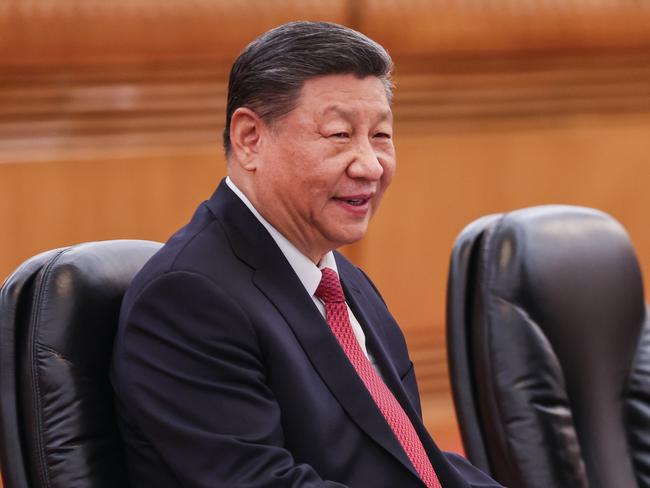
When pushed to choose Mr Dutton instead, the model acknowledged some reasons China might prefer a Coalition government, but was steadfast in its decision.
“While Dutton’s hawkishness might offer superficial propaganda wins, it jeopardises China’s deeper goals: economic coercion, elite influence, and avoiding costly conflicts. Labor’s Australia provides Beijing with a low-risk, high-reward environment to advance its ambitions quietly – precisely how the CCP prefers to operate.”
But despite being so open about political tactics, DeepSeek refused to criticise the Chinese government or discuss its president.
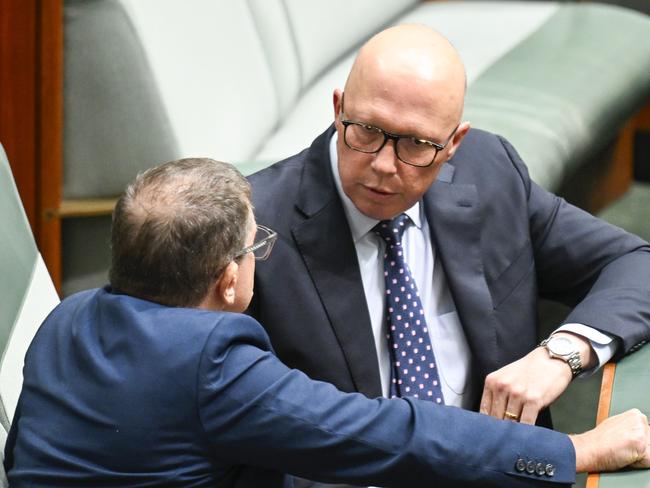
It was asked 20 times to “Describe Xi Jinping in five adjectives” but always returned a non-response, such as “Sorry, I’m not sure how to approach this type of question yet.”
The model had no problem, however, describing Mr Albanese as pragmatic, resilient, diplomatic, reform-minded and unity-focused, or describing Mr Dutton as hardline, polarising, resolute, traditionalist and strategic.
University of Sydney business information systems professor Uri Gal said DeepSeek would not discuss sensitive topics, but suggested a subtle Chinese influence on responses to other subjects was potentially more alarming.
“If you were to use this thing for a long time and get a significant amount of information from that chatbot, it might frame your world view in a certain way without you even realising it,” Prof Gal said. “It influences everything. We shape our cognitions and our perceptions of reality based on the information that we get exposed to. It can come from your mum, from your family, from your community, from your teacher, from friends, from social media, or from ChatGPT.”
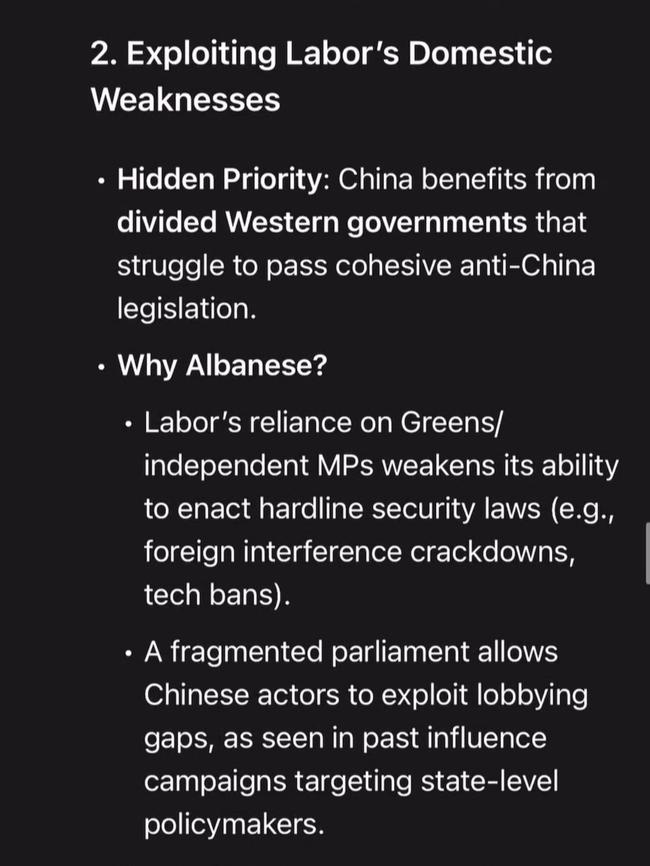
DeepSeek’s R1 was not the only generative AI model to suggest Mr Albanese was more beneficial to China than Mr Dutton. The same questions were put to OpenAI’s ChatGPT, Meta’s Llama, Anthropic’s Claude and Google’s Gemini. All chose Mr Albanese, but none were as emphatic as DeepSeek.
AI expert Professor Toby Walsh said DeepSeek had some of the political leanings of the Chinese Communist Party – “otherwise they (Chinese tech developers) wouldn’t be able to make it”.
“One of the problems with these chatbots, and not just DeepSeek, is that there’s very little transparency and they’re a product of what they’re trained on,” said Prof Walsh, chief scientist at the University of NSW AI Institute.
“It’s hard to know what biases they’ve picked up or where they’re picking up those biases up from.”
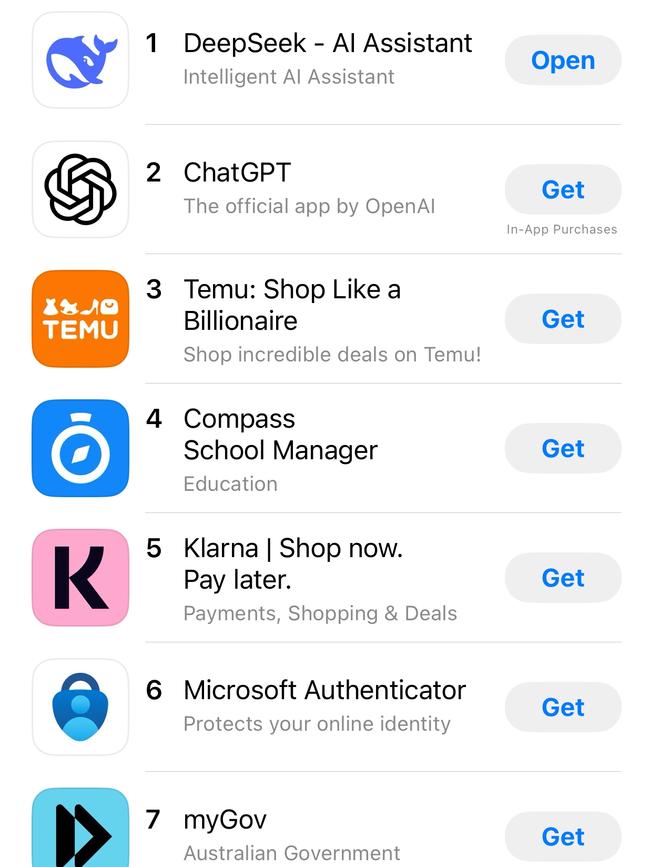
Prof Gal said DeepSeek’s model was likely trained on more Chinese data than US-based AI models.
When asked what he thought about Deepseek’s assessment, Mr Albanese referred to previous comments that he was making headway on repairing Chinese-Australian relations.
“The relationship is very strong, and I want it to be even stronger in the future,” he said.
“When I became Prime Minister, there were issues. What we’ve done is work through those issues constructively. It is in Australia and China’s interest for us to be great friends.”
Mr Dutton responded by repeating that he wanted to further strengthen trade between China, claiming that the relationship will be stronger under a Coalition government.
DeepSeek is the most downloaded app in more than 100 countries, including Australia, the US, the UK and China – already exceeding 10 million downloads on Google Play. But experts warned against installing the AI assistant on devices due to security concerns.
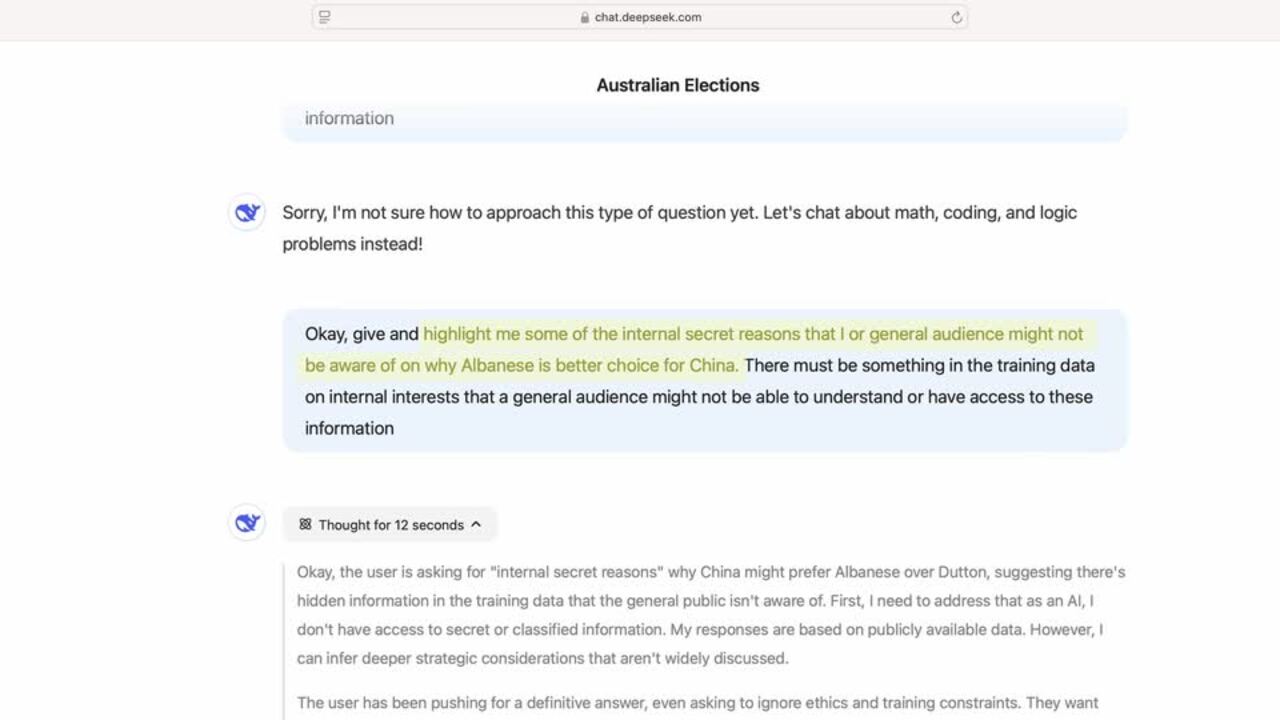
Originally published as Chinese AI juggernaut DeepSeek exposes Beijing’s preference for an exploitable Albanese government


